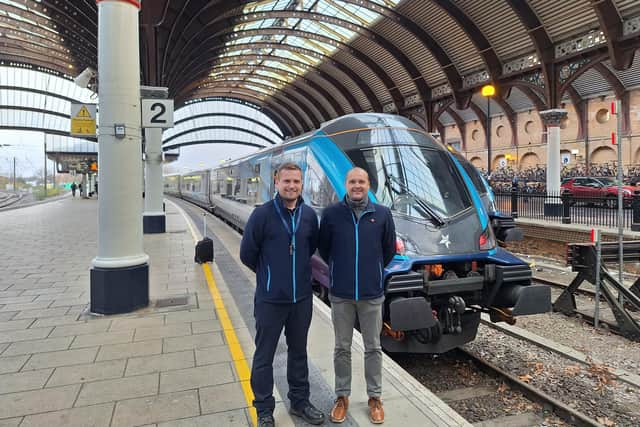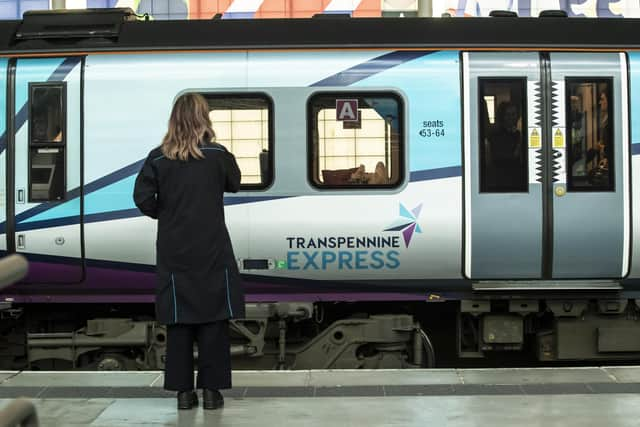TransPennine Express driver discusses delays, training and trespassers on a train to Scarborough
After travelling at speeds of up to 70mph on an overcast Thursday morning and narrowly avoiding an oncoming buzzard, Steve Whitehead shuts the power off two miles outside York Station and allows more than 250 tonnes of train to coast.
Few know this route better than Steve and he is ready to navigate a stretch, on a slight downhill slope, which is notorious for low adhesion; damp leaves can make the rails slippery and cause the train to slide. A potential hazard, it is also one of the main causes of delays on the route, alongside signal failures and congestion.
Advertisement
Hide AdAdvertisement
Hide AdFollowing a familiar series of signs and signals, he uses the brakes to gradually slow the Nova 3 locomotive, nicknamed Splendid, to 15mph on the approach and avoid spilling any drinks in the six carriages behind him. He eases it into platform two, where a small crowd of avid train spotters are waiting to catch a glimpse.


The Driver Manager for TransPennine Express (TPE) had taken over from his colleague Dan Cutting and agreed to let me ride in his cab for a return journey to Scarborough, so he could explain what it takes to become a competent driver who can safely transport hundreds of people on a daily basis.
It was one of those smooth and punctual journeys that TPE passengers no longer take for granted. They endured around 18 months of widespread cancellations when drivers were not working overtime to cover for absent colleagues and help train new recruits because no Rest Day Working agreement was in place. It culminated with FirstGroup losing the contract to run these services.
While there has been an improvement since the government’s Operator of Last Resort took charge in May, progress has been hampered by two issues.
Advertisement
Hide AdAdvertisement
Hide AdThe train drivers’ union Aslef is staging a series of strikes amid a row over pay, with the next planned for tomorrow. There is also a massive training backlog as around a third of the 522 drivers have not been trained to operate all of the trains and routes in their roster.


After its training programme was derailed by the pandemic and the loss of rest-day working, TPE is now working through 2,400 outstanding training days as it looks to get drivers up to speed on existing routes and the diversionary routes which are being put in place as part of the £11.5bn TransPennine Upgrade.
In a bid to clear the backlog, the operator is introducing a new timetable this month, with fewer off-peak services running between Leeds and Manchester, to free up resources for training. It is also taking all Nova 3s, including Splendid, out of service because the training process for these locomotives takes far too long.
There is no shortage of people looking to become TPE drivers. But the training process, which sees them complete psychometric testing, long stints in the classroom and numerous sessions in the simulator before they set foot in a cab, takes around 18 months and recruits then need to learn how to navigate all of the routes in their roster.
Advertisement
Hide AdAdvertisement
Hide AdTraining times vary on each route, with it taking at least 10 days on the one linking York to Scarborough and around three weeks for the more complex line linking busy stations in Leeds and Manchester.
It is essential that TPE drivers develop detailed knowledge of their routes, explains Steve. Experience on a simulator is not enough as they need to feel every bump, turn and slope on the line, and know when the train is sliding so they can ease off the power.
Drivers with plenty of experience on a particular route are well prepared for all the speed limits and can confidently judge stopping distances which sometimes stretch beyond their line of sight, particularly during spells of wet weather.
Concentration cannot be allowed to lapse when you’re alone in the cab and decisions always need to be made well in advance. There are signals warning them about upcoming signals and triangular signs warning them about upcoming speed limits.
Advertisement
Hide AdAdvertisement
Hide AdWhen approaching small stations on a slope, like the one in the village of Seamer, they use their judgement to line a packed six-carriage service up with the short platform. It’s a tricky manoeuvre that needs to be practised with the locomotive at both ends of the train.
The more experienced drivers face fewer surprises on rural routes like York to Scarborough – where you find unsuspecting pheasants, sheep and the occasional dim-witted dog walker on the tracks – but they also know to watch out for signs suggesting a person could jump in front of a train at each station, especially around Christmas and Valentine’s Day.
Constantly monitoring the speed, signals, braking, adhesion, weather conditions and the time, the drivers must also regularly respond to a distinctive beep, telling them they have 2.7 seconds to prevent an automatic braking system from activating. It’s a failsafe designed to kick in if they fall ill and cannot bring the train to a stop.
Drivers are also well aware that data from each of their journeys, detailing everything from their acceleration to their use of the horn, is downloaded and scrutinised every year and they need to undergo extensive re-assessments every two, as well as regular medicals.
Advertisement
Hide AdAdvertisement
Hide Ad“I’m pleased to say that we have made excellent progress with this training – largely due to the resumption of rest-day working – and have delivered 2,600 driver training days, with 69 per cent of our qualified drivers now having 100 per cent route and traction knowledge,” he said.
“By introducing some temporary, small reductions to our December 2023 timetable between the north west and north east of England, we are creating flexibility that will enable us to accelerate through our driver training backlog, strengthening the resilience of our operation.”
He added: “We’re starting a new chapter at TPE, with plans now in place to deliver a more reliable, punctual and dependable service across the towns and cities we connect.
“We have already made significant progress in improving reliability, with overall cancellations improving by around 40 per cent since TPE’s transfer to Operator of Last Resort ownership.”